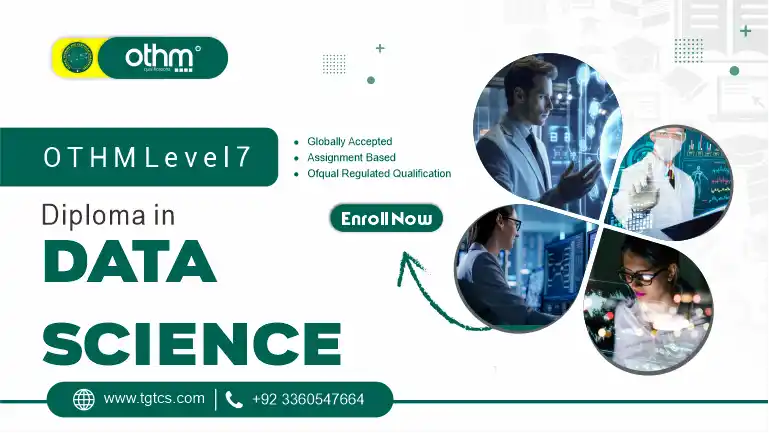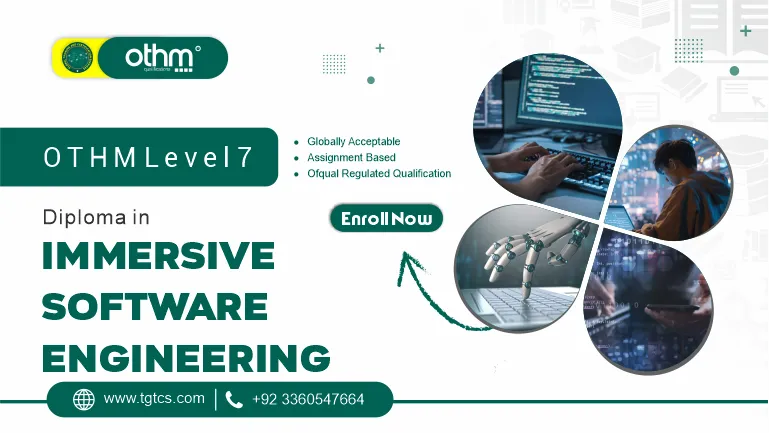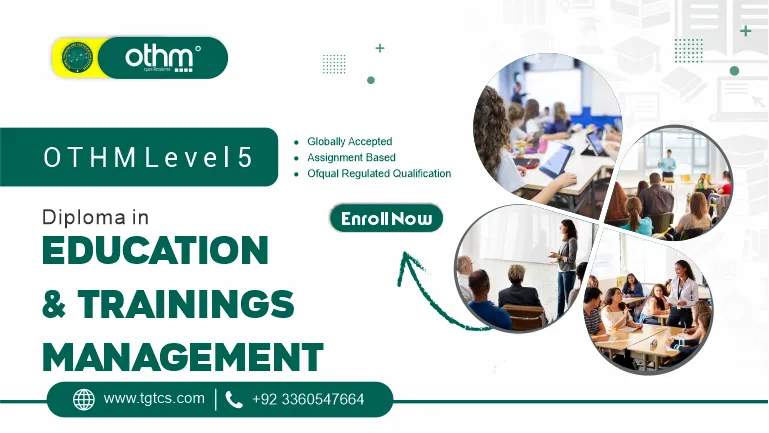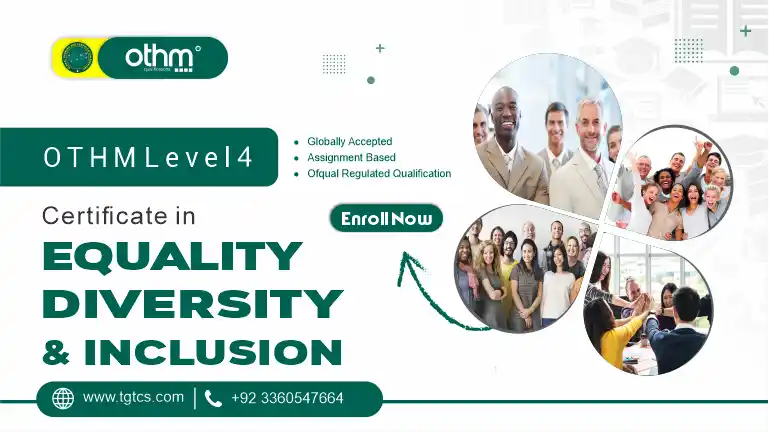OTHM Level 7 Diploma in Data Science
In today’s rapidly evolving digital landscape, data has become the backbone of decision-making and innovation across industries. Whether it’s predicting consumer behavior, optimizing business processes, or driving scientific research, the ability to harness data effectively is a game-changer. As organizations increasingly rely on data-driven insights, the demand for skilled data scientists has skyrocketed. To meet this growing need, the OTHM Level 7 Diploma in Data Science offers a comprehensive and advanced qualification designed to equip professionals with the knowledge and skills necessary to excel in this dynamic field.
The OTHM Level 7 Diploma in Data Science is a postgraduate qualification that provides a deep dive into the core concepts, methodologies, and tools used in data science. This program is tailored for professionals who want to advance their careers in data analytics, machine learning, and big data. It is also ideal for those looking to transition into the field from other disciplines.
The OTHM Level 7 Diploma in Data Science is more than just a qualification—it’s a stepping stone to a rewarding career in one of the most sought-after fields today. Whether you’re looking to upskill, reskill, or accelerate your career, this diploma offers the knowledge and practical experience you need to succeed in the world of data science.
OTHM Level 7 Diploma in Data Science provides individuals with the advanced skills and expertise needed to thrive in the fast-paced and rapidly evolving field of data science. Graduates of the program may pursue various career opportunities in industries such as finance, healthcare, marketing, e-commerce, and more, where data-driven decision-making is increasingly valued and essential for success.
Enroll in the OTHM Level 7 Diploma in Data Science.
The Global Training and Certification Services (tgtcs) is Offering All OTHM Certifications in Association with Inspire College of Technologies Uk (ICTQual).
OTHM Level 7 Diploma in Data Science designed in collaboration with industry partners to ensure that you graduate with the skills and knowledge demanded by employers in the field of data science. From big data technologies to data visualization techniques, you’ll learn the tools and techniques used in the industry today.
the OTHM Level 7 Diploma in Data Science provides individuals with the advanced skills and expertise needed to thrive in the fast-paced and rapidly evolving field of data science. Graduates of the program may pursue various career opportunities in industries such as finance, healthcare, marketing, e-commerce, and more, where data-driven decision-making is increasingly valued and essential for success.
The demand for data scientists is skyrocketing, with companies across industries hungry for professionals who can turn data into actionable insights. By earning your OTHM Level 7 Diploma, you’ll be well-positioned to seize exciting career opportunities and make a meaningful impact in the world.
OTHM Level 7 Diploma in data science benefits that will propel you towards success.
1. Gain Advanced Data Science Knowledge
- Understand core concepts of data science, including statistics, machine learning, and data analytics.
- Learn advanced techniques in big data processing, predictive modelling, and data visualisation.
- Apply theoretical knowledge to real-world datasets and business scenarios.
- Develop proficiency in programming languages commonly used in data science such as Python and R.
- Gain expertise in data-driven decision-making to support organisational strategies.
2. Enhance Career Opportunities and Professional Growth
- Qualify for senior roles such as Data Scientist, Data Analyst, Machine Learning Engineer, or AI Specialist.
- Gain a globally recognized OTHM Level 7 Diploma in Data Science.
- Open opportunities in multinational organisations, tech companies, financial institutions, and consultancy.
- Increase employability in high-demand data science and analytics roles.
- Position yourself as a leader in the rapidly growing data science industry.
3. Develop Practical Data Analytics Skills
- Analyse large and complex datasets to extract actionable insights.
- Apply data mining, statistical modelling, and predictive analytics techniques.
- Perform data cleansing, transformation, and validation effectively.
- Use visualisation tools to communicate findings clearly to stakeholders.
- Build practical skills to support business intelligence and strategic decision-making.
4. Strengthen Machine Learning and AI Competencies
- Understand the fundamentals of machine learning algorithms and their applications.
- Develop predictive models to support business and research decisions.
- Apply AI techniques to solve real-world problems.
- Evaluate and optimise machine learning models for accuracy and performance.
- Gain the ability to integrate AI solutions into organizational processes.
5. Improve Strategic Decision-Making
- Use data insights to inform organisational strategies and policies.
- Identify trends, patterns, and anomalies to guide business decisions.
- Support evidence-based decision-making across departments.
- Develop the ability to predict outcomes and reduce operational risks.
- Enhance organisational efficiency and competitive advantage through data-driven strategies.
6. Prepare for Leadership in Data-Driven Roles
- Develop the skills to lead data science projects and teams.
- Coordinate analytics initiatives across business units or organisations.
- Implement data governance and ethical data practices.
- Guide decision-makers on leveraging data for strategic advantage.
- Become a recognised expert in data science and analytics leadership.
7. Gain Hands-On Experience Through Real-World Projects
- Work on datasets and scenarios that simulate real business challenges.
- Apply learned techniques to practical problems in finance, marketing, healthcare, and technology.
- Develop the ability to translate data insights into actionable business strategies.
- Build a portfolio of projects to showcase expertise to employers.
- Enhance critical thinking and problem-solving in data-intensive environments.
8. Achieve Global Recognition and Certification
- Receive the OTHM Level 7 Diploma in Data Science, recognized internationally.
- Demonstrate advanced competency in data science and analytics.
- Boost credibility and professional standing in the data science community.
- Expand career opportunities in high-growth global industries.
Mandatory Unit
- Data Science Foundations (20 Credits)
- Probability and statistics for data analysis (20 Credits)
- Advanced Predictive Modelling (20 Credits)
- Data Analysis and Visualisation (20 Credits)
- Data Mining, Machine Learning and Artificial Intelligence (20 Credits)
- Advanced Computing Research Methods (20 Credits)
Data Science Foundations
- Understand the scope of Data Science and the roles of Data Scientists.
- Understand Data Science core topics.
- Understand Hadoop and Artificial Intelligence.
- Assess the role, responsibilities, and challenges for data scientists.
Probability and Statistics for Data Analysis
- Develop understanding of distribution theory.
- Develop understanding of classical inference.
- Develop understanding of Bayesian statistics.
- Develop understanding of Linear modelling.
Advanced Predictive Modelling
- Develop models using binary logistic regression and assess their performance.
- Develop applications of multinomial logistic regression and ordinal logistic regression.
- Develop generalised linear models and carry out survival analysis and proportional hazards regression.
Data Analysis and Visualization
- Critically evaluate the theoretical foundation of data analytics that determine decision-making processes.
- Evaluate a range of predictive analytic techniques to discover new knowledge for forecasting future events.
- Demonstrate prescriptive analytic methods for finding the best course of action for a situation.
Data Mining, Machine Learning and Artificial Intelligence
- Understand the theoretical foundation of machine learning, Artificial Intelligence (AI).
- Understand the approaches, techniques and tools used to deploy intelligent systems.
- Understand technical aspects of AI based systems including modifications and ethical considerations.
Advanced Computing Research Methods
- Be able to evaluate research approaches in the computing discipline.
- Be able to critically review literature on a relevant research topic.
- Be able to design research methodologies for a computing research problem.
- Be able to develop a research proposal.
The course is well-suited for:
- Recent Graduates: Graduates with a background in computer science, mathematics, statistics, engineering, or related fields who are looking to kickstart their careers in data science.
- Professionals Seeking Career Advancement: Working professionals who wish to transition into the field of data science or enhance their existing skills to advance their careers.
- Data Enthusiasts: Individuals with a keen interest in data analysis, machine learning, and predictive modeling, regardless of their academic or professional background.
- Entrepreneurs and Business Owners: Business owners and entrepreneurs who recognize the value of data-driven decision-making and want to leverage data science techniques to drive business growth and innovation.
- IT and Technology Professionals: IT professionals who want to expand their skill set and specialize in data science, gaining a competitive edge in the ever-evolving technology landscape.
- Researchers and Academics: Researchers and academics interested in leveraging data science techniques to enhance their research projects or curriculum development in fields such as social sciences, healthcare, finance, and more.
- Data Analysts and Business Intelligence Professionals: Data analysts and business intelligence professionals who want to deepen their understanding of advanced data analysis techniques and broaden their career opportunities.
- Career Changers: Individuals from diverse backgrounds who are looking to make a career change into the exciting and rapidly growing field of data science.
Course Overview
Course Level
Level 6
Course Units
6 mandatory Units
TQT
1200 hours
GLH
480 hours
Duration
6 to 12 Months






